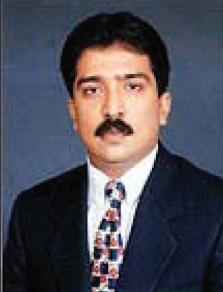
Dr Asim Mumtaz
“Aamir I think this is the right time we should have a Society for Chemical Pathology” Asim said to me on that summer evening of May 2003 in his house at Fane Road Lahore. “Stop day dreaming. It’s a very difficult job and don’t expect any help from me, I am too busy….” I replied in a very cold tone while enjoying my samosa and tea.
“I have prepared some preliminary documents and have met some lawyers regarding legal aspects of formation of a professional body” I could see a brightness in Asim`s eyes when talking of this dream. That day I realized that nobody can stop Asim in this task. I just gave him one suggestion that he should come to Rawalpindi some day and see Brig (then) Farooq Ahmad Khan.
So after several meetings at AFIP and in Lahore, PSCP became a reality!! The first meeting of the PSCP council was held on 22nd March 2003 at Children’s Hospital, Lahore.Twenty Chemical Pathologists from different cities attended the meeting which was presided by Brig (then) Farooq Ahmad Khan. (Narrative : Surg Cdre Aamir Ijaz)
Pathology is a medical specialty that focuses on determining the cause and nature of diseases. By examining and testing body tissues (e.g. biopsies, pap smears) and fluids (e.g. blood, urine) pathology helps doctors diagnose and treat patients correctly.
Only moments after birth every newborn receives a heel prick test that screens for serious genetic conditions. Throughout childhood, adulthood and old age, pathology continues to help prevent, diagnose and treat infections, allergies, chronic diseases, cancer and countless other medical conditions. Without pathology, the high standard of medicine would be impossible.
Pathology services are an essential part of almost all aspects of a person’s healthcare.
There are several areas of pathology practice, related either to the methods used to test tissue samples or to the type of diseases being investigated. They include:
– Anatomical Pathology [Histopathology / Cytopathology](the diagnosis of disease from examining tissue samples and cellular smears)
– Chemical Pathology (the use of chemical analysis to test tissue, blood and body fluid samples)
– Genetics (the diagnosis of genetic conditions from tissue, blood and body fluid samples)
– Haematology (the testing of blood, blood cells and blood products)
– Immunopathology (the examination of tissue, blood and body fluid samples for immune responses associated with disease)
– Microbiology (the study of microscopic organisms in tissue, blood and body fluids)
Chemical pathology is the branch of pathology dealing with the biochemical basis of disease and the use of biochemical tests for diagnosis and management. Doctors in the speciality have dual responsibilities. First there is the provision of a reliable analytical service, for example measuring serum electrolytes, indices of liver function, hormones, drugs and tumour markers in hundreds of patient samples every day. Many of these analyses are performed on automated analysers, usually operated by biomedical scientists, but the management of the process (and the staff), assurance of quality and provision of guidance on the selection of tests and assessment of the significance of the results (particularly with some of the less generally familiar tests) are the province of the chemical pathologist.
Second, we have an important clinical role, not only advising on the management of patients with metabolic disturbances but increasingly having direct responsibility for such patients in out-patient clinics and on the wards.
Chemical Pathologist studies diseases in humans and animals. They work in a laboratory. Some Chemical Pathologists also teach students in universities.
A Chemical Pathologist will analyse a specimen (sample) and diagnose the disease. This report will go to the doctor who will then prescribe the necessary medicines or treatment.
A Chemical Pathologist can also perform autopsies. They try and find the reason why the person died. They might have to give evidence in court.
Chemical Pathology is also known as Clinical Biochemistry or Clinical Chemistry.
What does a Chemical Pathologist do?
– study and research diseases
– analyse samples to determine the disease
– write reports
– perform autopsies
– teach
– appear in court
We represent the interests of all our members in many governmental, political, professional and community forums.